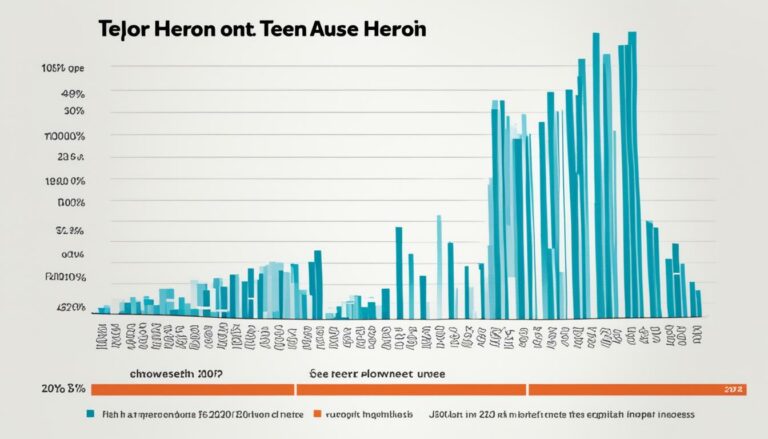Understanding Teen Resentment: Why Do Teens Hate Their Parents?
Welcome to our guide on understanding teen resentment and improving parent-teen relationships. The teenage years can be a challenging time for both parents and adolescents. As teens undergo significant physical, emotional, and social changes, it’s not uncommon for conflicts to arise with their parents. In this article, we will delve into the reasons behind this resentment and provide valuable insights on bridging the generation gap.
It’s essential to recognize that teen-parent conflict is a natural part of adolescent development. By understanding the underlying causes, parents can better navigate these turbulent times and build stronger connections with their teens. Through improved communication, effective emotional support, and respectful boundaries, families can foster healthier relationships and create an environment where both parents and teenagers feel understood and valued.
Key Takeaways:
- Teen resentment towards parents is often a result of developmental changes and a desire for independence.
- Misunderstanding emotions can contribute to conflicts, creating a need for open and non-judgmental communication.
- Pressures and expectations from both sides can strain the parent-teen relationship, necessitating realistic expectations and supportive guidance.
- Active listening and spending quality time together can help bridge communication gaps.
- Responding calmly and empathetically to negative statements like “I hate you” can promote understanding and healing.
A Cry for Independence

During the teenage years, adolescents begin to assert their independence. This desire for autonomy can lead to conflict with parents who may feel threatened or not listened to. Recognizing the importance of independence and providing guidance, rather than dictating choices, can help foster a healthier parent-teen relationship. Additionally, giving teens responsibilities, such as chores, can contribute to their sense of independence while still contributing to the family.
It’s common for teenagers to rebel against their parents and seek more independence. The process of growing up involves developing their own identities and making decisions for themselves. This can sometimes clash with the expectations and values of their parents, leading to conflicts and tension in the household.
However, it’s important for parents to understand that teenage rebellion is a normal part of adolescent development. It’s a way for teenagers to assert their individuality and establish their own beliefs and values. While it can be challenging for parents to navigate this period, it’s essential to bridge the generation gap and maintain a strong parent-teen relationship.
Here are some strategies for dealing with parental conflict and bridging the generation gap:
- Recognize their need for independence: Understand that your teenager’s desire for independence is a natural and healthy part of their development. Instead of viewing it as a threat, embrace it as an opportunity for growth and self-discovery.
- Provide guidance: Instead of imposing strict rules and restrictions, provide guidance and support as your teenager explores their independence. Offer advice and share your own experiences, but allow them to make their own decisions and learn from their mistakes.
- Encourage responsibility: Give your teenager age-appropriate responsibilities, such as chores or part-time jobs. This not only fosters a sense of independence but also teaches them important life skills and the value of contribution to the family.
- Listen and communicate: Engage in open and honest conversations with your teenager. Listen to their perspectives and opinions, even if they differ from your own. Create an environment where they feel heard and understood, which can help bridge the generation gap.
- Respect their choices: While it’s essential to guide and provide boundaries, respect your teenager’s choices when they are reasonable and safe. Allowing them to make decisions for themselves helps build trust and independence.
By implementing these strategies, parents can navigate the challenges of teenage rebellion, deal with parental conflict, and bridge the generation gap. Remember, it’s a gradual process that requires patience, understanding, and effective communication.
Misunderstanding Emotions

Teenagers often experience complex emotions that they may struggle to understand or express. This can lead to mood swings and outbursts that may strain the parent-teen relationship. It’s important for parents to understand and acknowledge the emotional challenges their teenagers face.
Creating a safe space for teens to express their emotions without judgment is crucial. Teenagers need to feel that their feelings are valid and that they will be heard. Active listening is key to nurturing a healthy parent-teen relationship.
“I know it can be difficult to navigate through these intense emotions, but I’m here to listen and support you.”
By letting your teenager know that their emotions are valid and providing a non-judgmental space, they will be more likely to openly communicate their concerns and fears. Offering empathy and understanding can help resolve parent-teen issues and strengthen the bond between parents and teenagers.
To further nurture a healthy parent-teen relationship, parents can also help their teenagers develop emotional intelligence. This includes teaching them how to identify and manage their emotions effectively.
“It’s normal to feel overwhelmed or confused by your emotions. Let’s work together to understand and manage them.”
The image above represents the intricate dynamics of understanding teen-parent conflict. It serves as a reminder of the challenges parents and teenagers face when it comes to emotions.
Pressure and Expectations in the Parent-Child Relationship

Adolescence can be a tumultuous time for teenagers as they face various academic and social pressures that can often feel overwhelming. The constant need to meet expectations from both society and parents can significantly impact their mental health and overall well-being. Parents who place excessive pressure on their teenagers may inadvertently contribute to feelings of resentment and hostility.
It is essential for parents to understand that setting unrealistic expectations can place undue stress on their teens and strain the parent-child relationship. Adolescents need support and guidance as they navigate through the challenges of adolescence. By nurturing healthy parent-teen relationships and focusing on effective communication, parents can create a supportive environment that encourages personal growth and development.
- Set realistic expectations: Rather than pressuring teens to achieve perfection, it is important for parents to set realistic goals that consider their individual capabilities and interests. Encouraging them to strive for personal growth and improvement, rather than absolute perfection, will help alleviate some of the pressure they may feel. This approach allows teenagers to explore their passions and find their own path, free from the burden of unattainable expectations.
- Provide support and guidance: Teenagers need guidance and a safe space to express themselves without fear of judgment. Parents should actively listen to their concerns, validate their feelings, and offer guidance when appropriate. By providing emotional support, parents can help alleviate the pressures of adolescence and promote a healthier parent-teen relationship.
- Encourage pursuing passions and interests: Every teenager has their own unique interests and passions. Encouraging teens to explore these areas and pursue their passions helps foster self-confidence and a sense of purpose. By supporting their endeavors and showing genuine interest, parents can help teenagers build a strong sense of self and resilience to overcome challenges.
By understanding the pressures and expectations teenagers face, parents can foster an environment that promotes healthy parent-teen relationships. Through effective communication and supportive attitudes, parents can help alleviate the strain caused by excessive pressure and create an atmosphere of understanding and acceptance.
“Parents need to strike a balance between challenging their teens and easing the burden of unattainable expectations. By setting realistic goals and providing support, parents can help their teenagers navigate the pressures of adolescence and foster healthy relationships.”
| Reasons why teens hate their parents: | Understanding teen-parent conflict: | Nurturing healthy parent-teen relationships: | Effective communication with teenagers: |
|---|---|---|---|
| Excessive pressure and expectations | Miscommunication and misunderstanding | Building trust and respect | Active listening and empathy |
| Lack of autonomy and independence | Conflict over rules and boundaries | Encouraging open and honest communication | Providing guidance and support |
| Lack of emotional support | Parental control and authority | Creating a safe and accepting environment | Respecting teenagers’ opinions and feelings |
Communication Breakdown

Effective communication is crucial for nurturing healthy parent-teen relationships and dealing with parental conflict. However, communication can often break down between parents and teenagers, leading to misunderstandings and distance.
Teenagers may feel misunderstood, ignored, or not taken seriously by their parents, which can contribute to the breakdown of communication. It’s important for parents to create an environment where their teens feel approachable and listened to.
One way to improve communication is by actively listening to teenagers without interrupting or dismissing their concerns. This means giving them the space and time to express themselves, even if their opinions differ from our own. By doing so, parents can validate their teen’s emotions and demonstrate that they are valued and respected.
Spending quality time together without distractions is another effective way to strengthen the bond and improve communication. This can be as simple as having regular family dinners or engaging in activities that both parents and teenagers enjoy.
Here are some tips for nurturing effective communication with teenagers:
- Be approachable and non-judgmental.
- Listen actively and attentively.
- Validate their emotions and concerns.
- Avoid interrupting or dismissing their opinions.
- Set aside quality time for meaningful conversations.
“Communication is the key to any healthy relationship. By actively listening to your teen and creating a safe space for open dialogue, you can bridge the communication gap and build a stronger parent-teen bond.” – Dr. Sarah Thompson, Family Therapist
By prioritizing effective communication and nurturing healthy parent-teen relationships, parents can create a supportive and understanding environment for their teenagers. This can not only improve communication but also foster mutual respect and strengthen the parent-teen bond.
Tips for Effective Communication with Teenagers
| Tip | Description |
|---|---|
| Be approachable | Create an environment where your teen feels comfortable approaching you with their concerns. |
| Listen actively | Give your full attention when your teen is talking and avoid interrupting. |
| Validate their emotions | Acknowledge and empathize with your teen’s feelings, even if you don’t agree with them. |
| Avoid judgment | Refrain from criticizing or dismissing your teen’s opinions, creating a safe space for open dialogue. |
| Set aside quality time | Dedicate regular time for meaningful conversations and activities that strengthen your bond. |
Having Independence Boundaries

While independence is crucial for teenagers to develop into independent individuals, they still require their parents’ support, guidance, and accountability. To navigate the delicate balance between granting independence and setting boundaries, parents can establish rules and consequences that teach teens about responsibility while respecting their choices.
By allowing teenagers to make decisions within certain parameters, parents show that they trust their judgment while ensuring their safety and well-being. This approach helps foster a sense of autonomy and self-confidence in teenagers, allowing them to learn from their actions and experience the consequences of their choices.
Parents can also use open and respectful communication to discuss and negotiate these boundaries with their teenager. This helps teenagers understand the reasoning behind the rules and encourages them to take ownership of their actions. Effective communication can bridge the generation gap and reduce conflicts arising from misunderstandings or misinterpretations.
“Setting boundaries is not about limiting freedom; it’s about promoting growth and responsibility.”
Establishing Independence Boundaries:
- Clearly define expectations and rules regarding curfew, school performance, household chores, and technology use.
- Involve your teenager in setting boundaries to ensure their input and perspective are considered.
- Be consistent in enforcing the established boundaries to maintain structure and accountability.
- Encourage open and honest communication, allowing your teenager to express their opinions and concerns.
- Respect your teenager’s privacy while ensuring their safety and well-being.
By finding the balance between granting independence and setting boundaries, parents can nurture healthy parent-teen relationships while allowing teenagers the space they need to grow and develop.
| Benefits of Independence Boundaries | Benefits of Setting Boundaries |
|---|---|
| Encourages decision-making skills | Teaches responsibility and accountability |
| Promotes self-confidence and autonomy | Ensures safety and well-being |
| Allows teenagers room for personal growth | Establishes structure and consistency |
| Fosters trust and mutual respect | Reduces conflicts and misunderstandings |
My Teen Hates Me
Many parents find themselves feeling hurt and frustrated when their teenager expresses hatred towards them. It’s important to understand that this is often a normal part of the adolescent stage. Parents can work on improving their relationship with their teen by resolving parent-teen issues, enhancing communication, and nurturing a healthy connection.
Teenagers may express intense emotions, including anger, towards their parents. This can stem from a variety of factors such as the desire for independence, the need to establish their identity, or frustration with rules and boundaries. As parents, it’s crucial to remember that your teen’s emotions are not a reflection of your love or parenting skills.
To improve parent-teen relationships, effective communication is key. Create a safe space for your teen to express their feelings and concerns without judgment. Actively listen to their perspective, validate their emotions, and show empathy. Responding with understanding and empathy can help bridge the gap between you and your teen.
Understanding the Reasons Behind Negative Behavior
It’s important to delve into the reasons behind your teen’s negative behavior. Are they feeling unheard or misunderstood? Are they struggling with school or peer pressure? By gaining insight into their emotions and experiences, you can address the underlying issues and find constructive solutions together.
When conflicts arise, it’s essential to respond appropriately. Avoid reacting impulsively out of anger or frustration as this may escalate the situation further. Instead, take a step back, breathe, and approach the conversation with a calm and patient demeanor. By modeling respectful behavior and effective communication, you can set a positive example for your teen.
Building a Stronger Relationship
Building a stronger relationship with your teen takes time and effort. Consistently show your love and support, even when faced with challenging behavior. Find opportunities to bond and spend quality time together, engaging in activities that both of you enjoy.
Remember that independence and boundaries are crucial for teenagers. Allow them to make decisions and take responsibility for their actions, but also provide guidance and establish clear boundaries. Helping your teen navigate their newfound independence while still ensuring their safety and well-being is essential. Find a balance that respects their individuality while maintaining a sense of structure.
By focusing on improving parent-teen relationships, resolving conflicts, and fostering effective communication, you can work towards building a stronger bond with your teen. Remember that it’s normal for your teen to experience negative emotions, and their expressions of hatred are often a temporary phase. With patience, understanding, and genuine effort, you can navigate these challenging times and cultivate a relationship based on mutual respect and love.
| Ways to Improve Parent-Teen Relationships | Benefits |
|---|---|
| Effective communication | – Better understanding of each other’s perspectives – Strengthened bond and connection – Resolution of conflicts |
| Active listening | – Increased trust between parent and teen – Validation of teen’s feelings and experiences – Enhanced problem-solving abilities |
| Setting clear boundaries | – Promotes a sense of security and structure – Teaches responsibility and accountability – Reduces conflict and misunderstandings |
| Show love and support | – Builds a sense of trust and acceptance – Provides emotional security – Strengthens the parent-teen bond |
How to Respond When Your Teen says “I Hate You”
It can be incredibly hurtful when a teen says “I hate you” to their parent. This statement can trigger strong emotions and may leave parents feeling angry, hurt, or even betrayed. However, responding with anger or hurt can escalate the situation and damage the parent-teen relationship further. Instead, it’s important for parents to respond calmly and thoughtfully, aiming to de-escalate the tension and rebuild trust.
Here are some steps to consider when responding to your teen’s hurtful words:
- Acknowledge your feelings: It’s natural to feel hurt or upset when your teen expresses hatred towards you. Take a moment to acknowledge these emotions, but try not to let them dictate your response.
- Take a moment to calm down: Before responding, it’s important to calm yourself and collect your thoughts. Taking a few deep breaths or stepping away from the situation can help you regain emotional control.
- Examine the situation: Try to understand the underlying reasons behind your teen’s outburst. Are they going through a particularly challenging time? Are there unresolved issues or conflicts in the relationship?
- Revisit the conversation: Once emotions have cooled down, revisit the conversation with your teen. Choose a time when both of you are calm and receptive to dialogue. Avoid blaming or accusing, and instead, focus on understanding each other’s perspectives.
- Remind your teen about acceptable behavior: While it’s important to validate your teen’s emotions and allow space for expression, it is equally important to set boundaries. Remind your teen that hurtful words are not acceptable and discuss alternative ways to communicate their feelings.
Remember, this is an opportunity to teach your teen about healthy communication, conflict resolution, and empathy. By responding in a calm and respectful manner, you can open up a dialogue that allows for understanding and growth. Keep in mind that building a strong parent-teen relationship takes time and effort, but it is possible to improve the connection and resolve conflicts.
Example Dialogue:
Teen: “I hate you!”
Parent: “I can see that you’re upset right now. Let’s take a moment to calm down and talk about what’s going on.”
(After both have calmed down)
Parent: “I want you to know that it hurt me when you said you hate me. I understand that you’re upset, but let’s find a way to express your feelings without using hurtful words. Can you tell me what’s bothering you?”
Teen: “I feel like you don’t understand me and are always trying to control me.”
Parent: “I hear you, and I never want you to feel that way. Let’s discuss our expectations and boundaries together so that we can find a balance between your independence and my guidance.”
By responding calmly and opening up a dialogue, you can address the underlying issues and strengthen the parent-teen relationship. It may take time to rebuild trust, but with patience and effective communication, you can navigate through this challenging phase and improve your connection with your teen.
Conclusion
Building and nurturing a healthy and respectful parent-teen relationship is not an easy task. However, it is crucial to understand the reasons behind the emotions and behaviors of teenagers in order to make progress. By providing guidance and support, setting realistic expectations, fostering effective communication, and respecting their independence, parents can work towards improving the parent-teen relationship and bridging the generation gap.
It is important to remember that building a strong bond takes time, understanding, and commitment. Parents should create a safe space for their teens to express their emotions and actively listen to their concerns, without judgment. By showing empathy and acknowledging their feelings, parents can enhance trust and strengthen the connection with their teen.
Additionally, parents should strive to establish clear and respectful communication channels. Being approachable and spending quality time with their teen can help improve understanding and reduce misunderstandings. Setting boundaries while granting independence is also key to maintaining a healthy balance between guidance and autonomy.
Improving parent-teen relationships requires patience, open-mindedness, and a willingness to adapt. By taking these steps, parents can create an environment that nurtures a stronger bond with their teenager, fostering mutual respect and understanding. It is possible to bridge the generation gap and build a healthy, lasting relationship with your teen.
FAQ
Why do teenagers often develop feelings of animosity towards their parents?
Teenagers go through significant changes during adolescence and desire independence, which can lead to conflicts with their parents.
How can parents improve the parent-teen relationship and bridge the generation gap?
Parents can foster a healthier relationship by recognizing the importance of independence, providing guidance instead of dictating choices, and giving teens responsibilities.
Why do teenagers struggle with understanding and expressing their emotions?
Teenagers often experience complex emotions, and creating a safe space for them to express these emotions without judgment can help build trust.
How can parents support their teenagers in the face of academic and social pressures?
Parents can set realistic expectations, provide support and guidance, and encourage teens to pursue their passions and interests, which can improve their self-confidence and happiness.
What can parents do to improve communication with their teenagers?
Parents should strive to be approachable, actively listen to their teens, and spend quality time without distractions to strengthen the bond and improve communication.
How can parents establish independence boundaries with their teenagers?
Parents should find a balance between granting independence and setting boundaries by establishing rules and consequences that teach teens about accountability.
What should parents understand when their teenager expresses hatred towards them?
It’s important for parents to understand that this is often a normal part of adolescence and to respond appropriately by identifying the reasons behind the negative behavior.
How should parents respond when their teenager says “I hate you”?
Parents should take a moment to calm down, examine the situation, and respond calmly, reminding their teen that hurtful words are not acceptable while opening up a dialogue.
How can parents nurture a stronger bond with their teenager and bridge the generation gap?
Parents can work towards building a healthy and respectful relationship by understanding their teenager’s emotions and behaviors, providing guidance, and improving communication.







